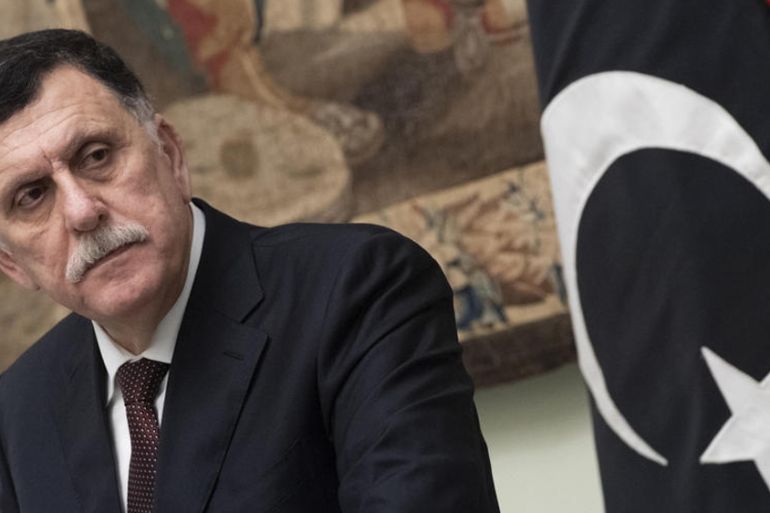UAE has no right to interfere in Libyan affairs: Fayez al-Sarraj
In an interview with Al Jazeera, head of UN-recognised government ponders United Arab Emirates’ motives inside Libya.

Libya’s Prime Minister Fayez al-Sarraj questioned the United Arab Emirates’ (UAE) reasons for establishing a military base in its eastern territory, and stressed the importance of a political solution to the conflict.
In an exclusive interview with Al Jazeera, the head of the Tripoli-based and internationally recognised Government of National Accord (GNA) said on Tuesday that Abu Dhabi has interfered in his country by supporting renegade military commander Khalifa Haftar, head of the eastern-based Libyan National Army (LNA).
Keep reading
list of 4 itemsCIA chief visits Libya after Lockerbie suspect handover
Libya: Violence to Votes
In Libya, anger and uncertainty after polls delayed
“Libya does not have any common borders with the UAE,” al-Sarraj said, adding this “raises a question about its goals of interfering” in the country.
-
UN’s top Libya envoy Ghassan Salame opposes UN troop deployment
-
No more arms: World powers pledge to halt Libya weapon transfers
Libya has been racked by turmoil since longtime leader Muammar Gaddafi was toppled in a NATO-backed uprising in 2011.
The oil-rich country has since been split between two rival administrations based in the country’s east and west amid a conflict drawing increasing involvement from foreign powers. Since April, the GNA has been under attack from forces loyal to Haftar, which on January 6 captured the strategic coastal city of Sirte.
Pro-Haftar forces are supported by the UAE, Saudi Arabia and Egypt. Al-Sarraj has also accused Paris of supporting Haftar and tacitly backing his assault on Tripoli – claims denied by French officials.
|
|
‘Cautiously optimistic’
Al-Sarraj also said Haftar is “not a serious partner for achieving peace in Libya”, and he will not sit with the military commander again following Sunday’s Berlin summit.
The summit, which was hosted by German Chancellor Angela Merkel and United Nations Secretary-General Antonio Guterres, sought a stronger commitment from world powers and regional actors to non-interference in Libya and to genuinely support a fragile truce and adhere to the UN’s arms embargo.
It was the latest of many diplomatic attempts aimed at pushing Libya on a path to peace.
Haftar accepted a request to designate members to a UN-proposed military commission, with five members from each side to monitor the implementation of the truce.
Based on past experiences where the GNA could not find a political partner, al-Sarraj said he was “cautiously optimistic” following the Berlin summit.
“Everyone has realised that there is no military solution in Libya,” he told Al Jazeera. “And despite [Haftar’s] party not believing in a political solution, the hope is that the parties loyal to [him] will reconsider their intentions so the political process for a solution can resume.”
Discussing Libya’s vital oil reserves, al-Sarraj said the North Africa nation would face a “catastrophic situation” if Haftar’s forces continued blockading oilfields. He expressed hope that foreign powers would put pressure on Haftar to reopen oil ports soon.
On January 12, the warring sides announced a truce in response to a joint call by the Turkish and Russian leaders. However, the talks for a permanent ceasefire ended without an agreement after Haftar left Moscow without signing the deal.